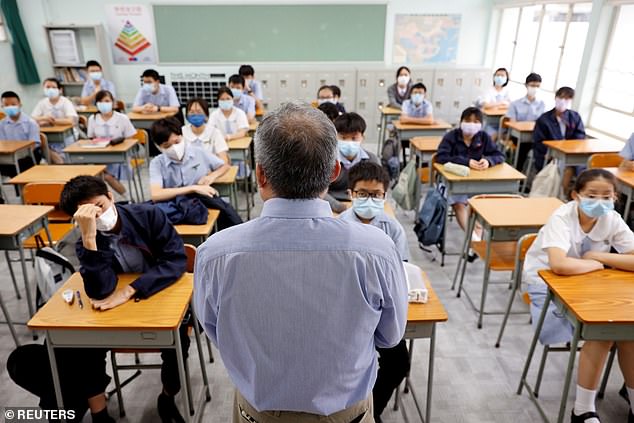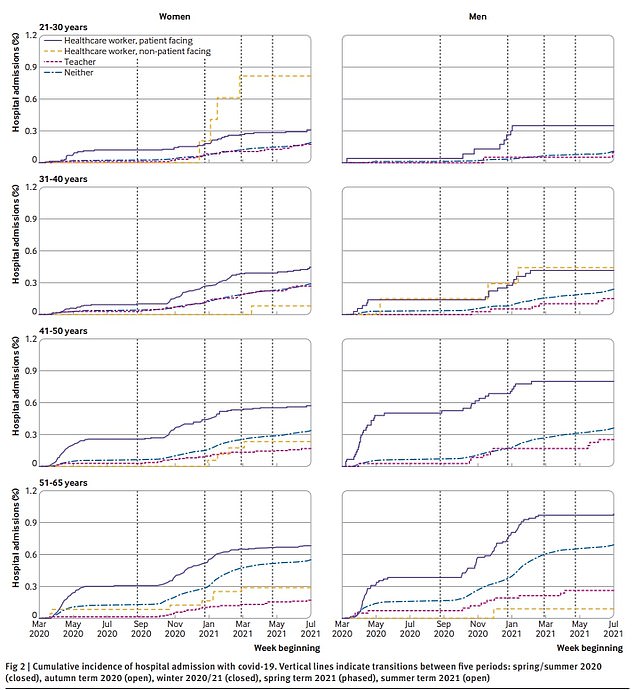Teachers are no more likely than other working age adults to be hospitalised with Covid or suffer a severe infection, a study reveals.
The findings should ‘reassure’ teachers and their families as they return to class at the start of the new school year, researchers say.
The University of Glasgow scientists examined all 132,420 cases of coronavirus in 21 to 65-year-olds in Scotland from March 2020 to July 2021.
Each was compared with a sample of uninfected people of the same age and gender at the infected person’s own GP practice.
Analysis revealed school teachers and others in their household were no more likely to be hospitalised with Covid or suffer a severe infection at any point during the last academic year.
This included periods when schools were fully open.
Over the year, the risk of being hospitalised with Covid was less than 1 per cent for teachers, healthcare workers and adults of working age among the general population.
Teachers were 23 per cent less likely to be admitted to hospital with Covid than other workers after adjusting for factors such as age, sex, general practice and ethnicity.

The findings should ‘reassure’ teachers and their families as they return to class at the start of the new school year, researchers say
They were also 44 per cent less likely to suffer severe Covid, meaning serious enough to require admission to intensive care or dying within 28 days of a positive test.
Teachers’ odds did worsen when schools were open, rising to the same level as the general working age population – but they were still half that of frontline health staff.
The scale of this rise was smaller in the summer term of 2021 than the autumn term of 2020, which is believed to be due to the success of the vaccine rollout.
The researchers concluded it was not possible to say why teachers are not at higher risk than the average working-age adult.
But they suggest it could be because teachers are generally healthier or take more care to avoid Covid than other occupations.

This graph shows the proportion of people hospitalised by Covid who were patient-facing healthcare workers (purple line), non-patient facing healthcare workers (yellow dashed line), teachers (purple dotted line) and the general population (blue dashed line). It reveals that teachers have not been more at risk from Covid than the general population
Antibody levels are declining in over-60s, official blood-testing data shows
Covid antibody levels are already starting to decline among over-80s, official data suggested today.
Ninety-two per cent of elderly adults tested positive for the Covid-fighting proteins in mid-August. This was down from a high of 95 per cent in May, according to results of a major blood-testing study.
Levels have also dipped for adults in their sixties and seventies.
Meanwhile, around eight in 10 young adults in the UK are now likely to have Covid antibodies.
The Office for National Statistics (ONS) data comes amid calls for Britain to confirm its booster vaccine campaign, which ministers hoped would begin next Monday.
No10’s advisers are still dithering over exactly who should be eligible — but a final decision is due imminently.
But MailOnline last week revealed the group is expected to only recommend third shots for people with severely weakened immune systems, which may only include several hundred thousand Britons.
This is despite real-world data which has already showed that vaccine efficacy can wane slightly over time.
US health chiefs last night released figures showing jabs now only cut the risk of hospitalisation by around 75 per cent against the Delta variant, compared to 95 per cent when the shots first became available — but they insisted the ability of vaccines to prevent serious disease was still high overall.
Advertisement
Most teachers were young, with an average age of 42, 80 per cent were women and 84 per cent had no existing conditions.
Writing in The BMJ, Dr David McAllister and colleagues said: ‘In our study, most of the teachers were young, were women, and had few comorbidities and so were at low absolute risk of severe Covid and hospital admission with Covid.
‘Furthermore, compared with healthcare workers and with other adults of working age who are otherwise similar, teachers showed no increased risk of hospital admission with Covid or severe Covid.
‘These findings should reassure most adults engaged in in-person teaching.’
The findings come as education unions have warned that a relaxation of Covid safety measures this term could lead to rising infections in schools.
Schools in Scotland have already returned after the summer break and the reopening is believed to have contributed to a rise in cases north of the border.
Dr Mary Bousted, joint general secretary of the National Education Union, said: ‘It is very good news and very reassuring that teachers have been found not to be at greater risk of hospitalisation because of Covid.
‘The study cannot determine why this is the case – although the fact that teaching is generally a profession for younger people and a large majority of the profession are female, and that teachers were prompt in being vaccinated, appear to be a significant contributory factor to these positive outcomes.
‘Nothing in this study, however, negates the importance of vigilance in suppressing Covid transmission in schools.’
She added: ‘The NEU has consistently pointed to the issues of Covid in schools as being mainly about onward community transmission, a position belatedly adopted by the Prime Minister in January when he described schools as vectors of transmission.
‘A spike in Covid infection in school-age children will lead to more children and staff missing school and run huge risks of viral transmission into the community where many adults do not share teachers’ general youth or good health.
‘We do remain concerned about our more vulnerable members, for example those who are registered as clinically extremely vulnerable or third-trimester pregnant women.
‘We must ensure greater protection for the many thousands in these categories.
‘The NEU calls on school and college leaders to give every reasonable dispensation to ensure those staff can continue to work safely.
‘This will certainly help keep down the number of school staff in hospital.’
Geoff Barton, general secretary of the Association of School and College Leaders, said: ‘While most staff will now have received coronavirus vaccinations, it needs to be remembered that the vast majority of pupils are unvaccinated.
‘The Government has decided to make the control measures in the autumn term a great deal less stringent than previously and it will now be very important that it keeps this situation under review.’
Source link : https://www.dailymail.co.uk/news/article-9947419/Teachers-NO-likely-hospitalised-Covid-study-reveals.html











